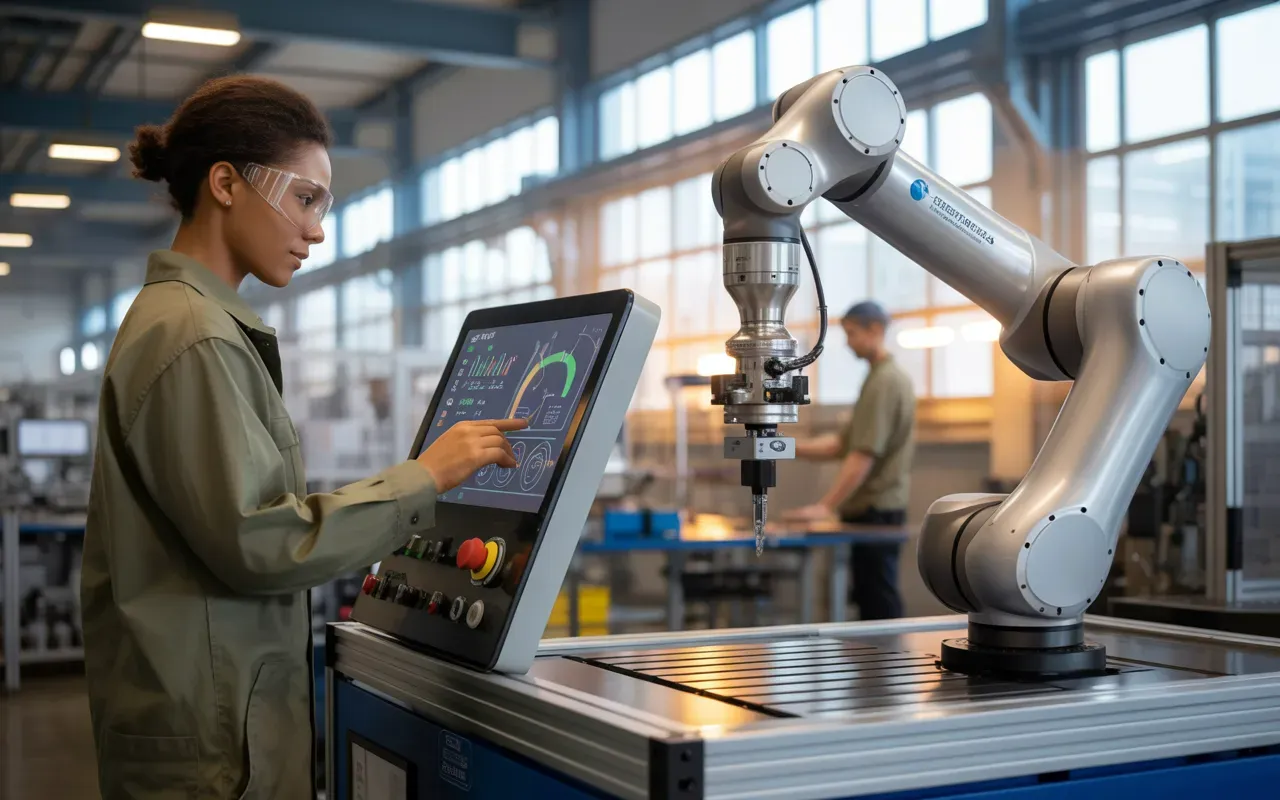
TL;DR
MES isn’t expensive long-term; cloud-based saves hardware costs, predicts breakdowns for faster ROI than repairs.
Highly secure with encryption, multi-cloud syncing; offline risks like fire loss exceed digital threats.
User-friendly interface needs no tech expertise; providers offer training for easy onboarding.
Doesn’t replace humans but frees them from repetitive tasks to focus on innovation, decisions.
Suits SMEs too via connectivity, analytics; integrates without expensive infrastructure overhauls.
Cerexio MES connects factories, automates scheduling, boosts OEE with Industry 4.0 tech.
Due to various misconceptions, some manufacturers hold back from fully optimising their company for better performance because they do not know how smart MES systems provide full visibility.
With the rise of industry 4.0 technology, however, companies that opt out of an advanced MES system may find it challenging to stay within the competition.
This could be due to the losses incurred by human errors and the overall waste of time, expenses and resources companies may suffer. By incorporating innovative technological solutions in the manufacturing industry, however, a company’s efficiency can be significantly raised.
Whether it concerns the automation of repetitive tasks, receiving data-driven insights or accessing forecasts on market changes, or machine breakdowns, there are many things manufacturers can gain with an intelligent MES system. Despite this, studies indicate that only around 10% of manufacturing companies leading in the industry have integrated industry 4.0 technologies.
As Cerexio is one of the leading software solution providers whose MES system is recognised globally and regarded as the best in Asia, this blog article will dismiss the most common myths associated with MES solutions.
Five Misconceptions About Adopting an MES Solution
For manufacturing organisations that have not integrated MES solutions, consider whether it is due to one of the below reasons. If so, this blog will hopefully dismiss that fear. It is time for managers to consider how other manufacturers are industry leaders in today’s world and take a page from their success stories to soar ahead.
Soon, implementing a digitally feasible solution will be a mandatory requirement for manufacturing companies who want to increase their reputation and raise profits in their firm.
MES Solutions Are Expensive to Maintain
Infusing a range of industry 4.0 technologies such as Industrial Internet of Things (IIoT), Artificial Intelligence (AI), Digital Twin, Augmented Reality (AR), Virtual Reality (VR), and others into one platform is not a simple solution.
While it is not the cheapest to purchase either, it is a very sustainable investment that offers long-term financial stability compared to a company that does not adopt an MES solution.
Traditionally, manufacturers have to incur costs on purchasing and maintaining multiple hardware. They additionally have to spend money on repairing manufacturing assets in the factory.
On the other hand, a smart MES solution is cloud-based and does not require any hardware to be purchased or maintained. Manufacturers can expect faster ROI since the advanced technology can process large amounts of data, identify threats which cannot be detected by humans in seconds, and warn managers of impending risks or machinery breakdowns.
In other words, money that would usually be spent on repairs or the losses a company will have to face when production is halted until the machinery is replaced can be prevented.
They Are Not Secure

Many believe that anything digital is prone to cyber-attacks and hence, poses a risk to the manufacturing company and its data.
While this is a valid concern, first consider depending on hard drives is safer. Are all critical data related to the factory safely backed up? If not, a factory destroyed by fire may have to start from the group up again.
In other words, data protection is an issue whether a manager controls all data online or offline. It, therefore, is not solely an issue concerning cloud-based software but requires the company itself to rethink security practices amongst the staff and the organisation.
MES solutions do provide a very tightly knit security. It encrypts all data ensuring that unauthorised personnel cannot access it. Embedded with multiple security protocols and multi-cloud syncing facilities, good MES system providers heighten a company’s protection.
Employees Will Need to Be Technology Experts to Handle the System
The more advanced the technology, the more technical expertise a team needs, right? Those that adopt an innovative MES system will find that not to be the case.
MES is a user-friendly platform requiring very little technical knowledge to handle the software. Some providers also provide exclusive training to companies when their solutions are brought, knowledge which can easily be transferred.
Considering that MES is one solution that integrates all roles in the factory, this gives an easy onboarding experience for those that join the company.
It also means that manufacturers can do away with other software, reducing the need to finance training sessions for employees for multiple software.
MES Will Lead To Unemployment or It Will Replace Humans

As industry 4.0 technology automates processes and no longer requires humans to spend time compiling reports which can be automatically generated, this does not mean an MES can replace humans entirely.
While an MES will help a company minimise its labour force by removing repetitive tasks, humans are yet required. They are needed to make decisions, and with mundane tasks out of the way, a company’s staff can focus on important duties related to innovation.
Humans should utilise the data-driven insights that are produced to put them into effect and use it to the company’s advantage. It is moreover humans that need to respond when the system warns the manufacturer that something needs repair or maintenance.
Thus, MES will never replace humans but will provide opportunities for manufacturers to utilise their existing resources to the best of their abilities.
MES Is Only Needed for Large Corporations
If an MES system’s primary functions were to be categorised into two, it would include connectivity and data analytics.
Thus, it is incorrect to presume that MES is a solution only suitable for a large corporation. Hence, if a small or mid-scale corporation enters the manufacturing sector, it must equip itself with the latest technologies to compete with others.
Companies need to think futuristically and build up a road map to succeed. Implementing an MES is one way to achieve a company’s long-term objectives.
Although some believe that it is too expensive of an investment for a small-scale company, it should be noted that MES integrates all systems and, therefore, does not require companies to replace systems with complex and expensive infrastructures.
Cerexio MES: Your Trusted Technology Solutions Vendor
Cerexio MES is a multi-faceted solution that supercharges all core manufacturing functions and connects all your factories at a single point.
It automates and elevates efficiency in all facets, from smart production process scheduling to enabling data-rich relationships with other systems like Enterprise Resource Planning Systems.
With industry 4.0 technology, enormous amounts of data are processed easily, letting the system help you to understand whether you have enough resources to take more orders. With detailed reports that warn you of impending risks, and the ability to withstand the power of 5G technology, Cerexio MES ensures that there are no idle times at the factory.
It also includes hi-tech security protocols to secure transmissions and control access by privatising data whilst ensuring the Overall Equipment Effectiveness (OEE) of your company.
Contact us for more details.
FAQs
No, MES provides sustainable ROI by eliminating hardware purchases, repairs, and downtime losses. Cloud-based processing detects threats instantly, preventing costly halts. Traditional setups waste more on multiple assets than this integrated, scalable solution delivers in efficiency gains.
Not more than offline storage; hard drives risk total loss from fire without backups. MES uses tight encryption, multi-security protocols, multi-cloud syncing to block unauthorized access, demanding company-wide security practices beyond just the software itself.
No, intuitive design requires minimal training; providers like Cerexio offer sessions for quick adoption. Single platform unifies roles, simplifies onboarding for new hires, cuts costs on multiple software trainings across the organization.
No, it removes mundane work like reports, letting staff innovate, decide, respond to alerts. Humans interpret data insights, handle maintenance; MES optimizes existing labor for higher-value roles, not replacement.
No, core connectivity and analytics benefit SMEs competing in Industry 4.0. Integrates systems without infrastructure replacements, building scalable roadmaps for growth from small-scale operations upward.
Cerexio connects factories centrally, automates scheduling, integrates ERP for resource checks. Processes big data via 5G, generates risk reports, ensures OEE with top security; Asia’s leading solution for full visibility.
